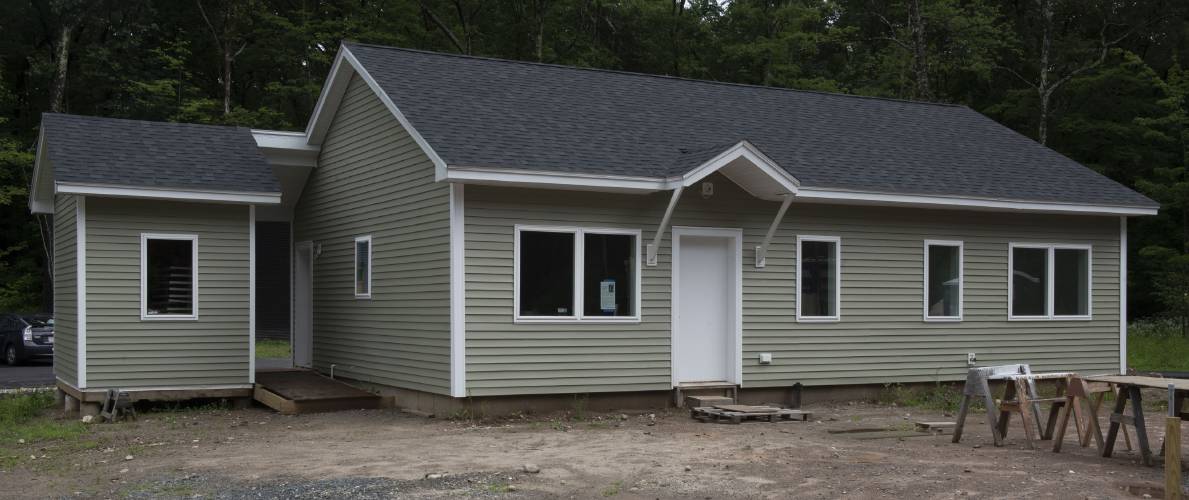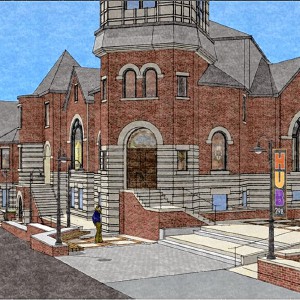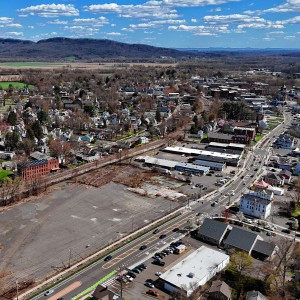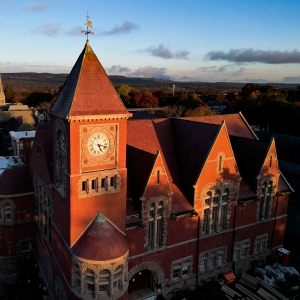Northampton makes case for joining fossil-fuel free pilot

Habitat For Humanity Housing on Burts Pit Road.
| Published: 01-07-2024 7:00 PM |
NORTHAMPTON — The city is hoping to join seven other Massachusetts municipalities in a new state pilot program that would require all future construction and major renovations to be free of fossil fuels.
The pilot program, established by the state’s Department of Energy Resources (DOER), late last month officially accepted seven municipalities into its program: Acton, Aquinnah, Brookline, Cambridge, Concord, Lincoln and Lexington.
Two other communities, Newton and Arlington, were also accepted on a conditional basis, having until Feb. 11 to prove they have met all requirements to participate in the program. Another town that had applied, West Tisbury, withdrew after not being able to meet the program’s affordable housing requirements.
With West Tisbury’s withdrawal, only nine of the 10 available slots for the program are filled, and Northampton is one of two substitute candidates hoping to occupy the last slot. The other candidate is the city of Somerville, located just outside Boston. A decision is expected to be made by DOER on the final slot by March 1.
Proponents of Northampton’s candidacy, such as state Rep. Lindsay Sabadosa, have noted that all other candidates are well-to-do suburbs of Boston or on Martha’s Vineyard, meaning that Northampton would be the only one located in the western part of the commonwealth.
“The program is not a pilot if it doesn’t include western Mass.,” Sabadosa said. “It’s looking better for us, but there’s criteria that needs to be met.”
In a letter submitting Northampton’s candidacy dated Nov. 9, Mayor Gina-Louise Sciarra noted the city’s location within the Pioneer Valley made it more vulnerable to the negative effects of greenhouse gas emissions, evidenced by the higher-than-average rates of asthma in children living in the city.
“Eliminating fossil fuel use in buildings is imperative in addressing this public health issue,” Sciarra wrote. “(We) welcome the opportunity to bring the fossil fuel-free demonstration project to represent western Massachusetts to make other regional communities aware of this essential next step to not only address adverse climate effects but also improve air quality.”
Article continues after...
Yesterday's Most Read Articles
 More than 130 arrested at pro-Palestinian protest at UMass
More than 130 arrested at pro-Palestinian protest at UMass
 Public gets a look at progress on Northampton Resilience Hub
Public gets a look at progress on Northampton Resilience Hub
 Northampton bans auto dealerships near downtown; zone change won’t affect Volvo operation on King Street
Northampton bans auto dealerships near downtown; zone change won’t affect Volvo operation on King Street
 UMass basketball: Bryant forward Daniel Rivera to be Minutemen’s first transfer of the offseason
UMass basketball: Bryant forward Daniel Rivera to be Minutemen’s first transfer of the offseason
 Town manager’s plan shorts Amherst Regional Schools’ budget
Town manager’s plan shorts Amherst Regional Schools’ budget
 Police respond to alcohol-fueled incidents in Amherst
Police respond to alcohol-fueled incidents in Amherst
Sciarra also said that the city had met the required threshold for providing affordable housing and multifamily housing developments necessary to qualify for the pilot program.
“Northampton’s commitment to environmental stewardship and greenhouse gas reduction runs deep, and our city consistently steps up to support those in need,” she wrote. “We proudly exceed the state’s affordable housing mandate with a current rate of 10.67%.”
Sabadosa said ensuring affordable housing was a key component in determining whether a candidate municipality can qualify for the program.
“It’s going green, but going green affordably,” she said. “The proof is in the pudding that this will work.”
The Northampton City Council previously passed a specialized building code that did not ban the future use of fossil fuels completely, but that any new building using fossil fuels would require on-site solar installations and wiring that would enable the building to switch to being all-electric at a future date. Several new affordable housing developments, such as three homes built on Burts Pit Road by Habitat for Humanity, already incorporate fossil fuel-free infrastructure, using solar-powered heat pumps to generate power.
If accepted into DOER’s program, the city would be taking an additional step further to try to meet its ambitious goal of obtaining carbon neutrality by 2030.
Carole Collins, the director of the city’s newly created Climate Action & Project Administration (CAPA) department, said in an interview that if selected for the pilot program, the city would work with builders to assist them in meeting the new requirements and that building without fossil fuels would also be economically beneficial in the long run.
“There’s really encouraging case studies that not only can it cost less to build to this standard but that you’re going to save money on operations,” Collins said. “You’re not going to have huge heating and cooling bills, and you’re going to be comfortable year-round, so there’s a lot of benefits to this type of protocol.”
Lisa Cunningham, co-founder of the ZeroCarbonMA advocacy group, called the advancement of the statewide pilot program a “huge milestone.”
“I hope it’s only the beginning of a sea change in the way we think about building, not just in Massachusetts but throughout the country,” she said.
Buildings are responsible for about 35% of greenhouse gas emissions in Massachusetts, making them the second-largest source behind the transportation sector, according to the Healey administration’s climate report card.
State law set a target of achieving net-zero emissions by 2050 and a series of escalating targets in the interim, and policymakers will need to substantially rein in sources of carbon to do so.
Although the program is limited to just a handful of cities and towns, its supporters argue that it will kick off a necessary shift away from fossil fuel infrastructure in buildings across the Bay State. Cunningham said use of those fuel sources needs to stop “immediately” if policymakers want to “stop digging the hole deeper.”
“This (program) still gets at just the tip of the iceberg, because we’re talking new or significantly new construction,” she said. “We now have to look to decarbonizing our built environment and our existing buildings.”
Alexander MacDougall can be reached at amacdougall@gazettenet.com.

 State Senate budget funds free community college for all
State Senate budget funds free community college for all ‘We can just be who we are’: Thousands show support for LGBTQ community at Hampshire Pride
‘We can just be who we are’: Thousands show support for LGBTQ community at Hampshire Pride Doors open at Tilton Library’s temporary home at South Deerfield Congregational Church
Doors open at Tilton Library’s temporary home at South Deerfield Congregational Church Area property deed transfers, May 2
Area property deed transfers, May 2
